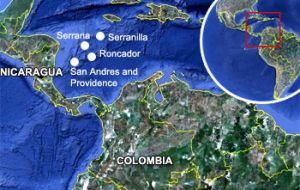MercoPress. South Atlantic News Agency
Colombia/Nicaragua maritime dispute reignites, despite International Court ruling
 President Santos argues the ICJ ruling is inapplicable because it does not comply with the Colombian constitution
President Santos argues the ICJ ruling is inapplicable because it does not comply with the Colombian constitution President Juan Manuel Santos presented before Colombia’s constitutional court a demand against the Pact of Bogotá arguing that a recent ruling from the International Court of Justice on a maritime dispute with Nicaragua does not comply with the Colombian constitution.
“There are two articles in the treaty (Pact of Bogotá) which clearly violate our Constitution since they say that the country must automatically change limits, borders by the sole virtue of some ICJ ruling”, pointed out Santos in his presentation.
The Pact of Bogotá dates back to 1948 and recognizes ICJ jurisdiction and was finally approved by Colombia in 1962, under Law 37. But the Colombian government has launched a strategy questioning the pact following an ICJ November 2012 ruling in which the maritime limits between Colombia and Nicaragua were redefined.
Last November a few days after the ICJ ruling the Colombian government got in touch with the Organization of American States Secretary General, OAS Jose Miguel Insulza and communicated that Colombia was withdrawing from the Pact of Bogotá and thus ceased to recognize the ICJ jurisdiction.
To this must the added the latest request to declare the pact unconstitutional, presented before the high court.
Santos pointed out that the Colombia constitution clearly orders that any “modification of our limits, our borders must be done according to a specific procedure: a treaty that must be approved by Congress”.
In other words this means that “we can’t accept any change in our limits, our borders automatically no matter the ruling” added Santos who made the presentation before the constitutional court next to Foreign minister Maria Angela Holguin and Justice minister Alfonso Gomez Mendez.
The decision to protest the alleged unconstitutionality of the Bogotá Pact is part on an ‘integral strategy’ announced last week by Santos in reply to the ICJ ruling which grated Nicaragua economic rights over 75.000 square kilometres in the Caribbean.
Santos argued that the ICJ was ‘inapplicable’ if before there is not a treaty ensuring the rights of Colombians in the region “because the maritime limits of Colombia can’t be modified automatically by an ICJ ruling”.
“Colombians are still outraged by the ruling of The Hague’s International Court of Justice, which pretends to give Nicaragua a significant portion of our historic and economic rights in the Caribbean” Santos said last week and announced that “we will subscribe a letter of protest along with other neighboring nations (Jamaica, Costa Rica, and Panama) that I will personally deliver to the United Nations’ Secretary General”.
“We condemn and will expose Nicaragua expansionism in the Caribbean”. Apparently Nicaragua is preparing to grant oil exploration licences in the disputed waters.
Foreign minister Holguín said that “at no time are we disregarding the jurisdiction of the court at The Hague; we’re not disregarding the ruling either. We’re saying that our constitution does not permit its applicability.”
“We want to talk with Nicaragua about a treaty,” Holguín said. “We want to know what (President) Daniel Ortega thinks about this.”
President Ortega has stated he wants Colombia to abide by the International Court’s ruling and that the government’s stance is nothing less than offensive.
“The court’s decisions are obligatory,” Ortega said. “They are not subject to discussion. It’s disrespectful to the court. It is as if we decided not to abide by the ruling because we didn’t receive 100% of what we asked, which in this case was the San Andrés archipelago”.
“Nicaragua wants peace,” Ortega said. “We have no expansionist aims…we only want what the court at The Hague granted us in its ruling”.





Top Comments
Disclaimer & comment rules-

-

-

Read all commentsAnother banana Republic refusing to accept a decision of the international court just because they lost their case.
Sep 16th, 2013 - 03:39 am 0Can any South American country be trusted ??
Doesn't sound like the happy south american family we keep getting shoved down our throats on here.
Sep 16th, 2013 - 03:40 am 0“our constitution doesn't allow it's applicability”
Sep 16th, 2013 - 04:02 am 0Err....change your constitution then dumbass
Commenting for this story is now closed.
If you have a Facebook account, become a fan and comment on our Facebook Page!